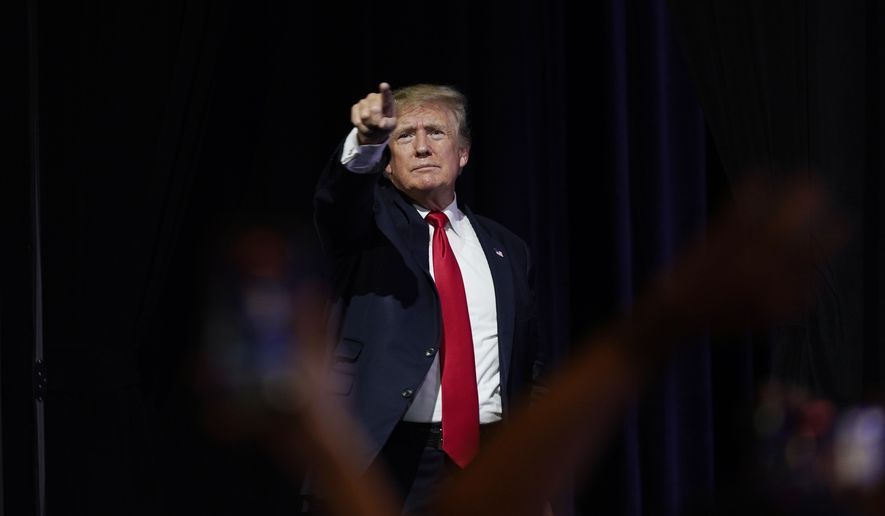Former President Donald Trump’s brand — the political superstar persona that fills stadiums and upstages the Republican Party — is showing signs of weakening.
In Texas, Mr. Trump’s preferred candidate in a special congressional election was defeated. Analysts are studying the race to see what it means for the former president’s endorsement powers.
In Washington, enough Republican senators ignored Mr. Trump’s attacks and complaints about a massive infrastructure package to advance the deal. The Republican support gave President Biden a shot at an infrastructure victory that eluded the previous administration.
What’s more, the House select committee investigating the Jan. 6 attack on the Capitol opened with no Republicans present to defend Mr. Trump or offer a counterperspective to charges that he fomented the riot.
The trio of setbacks for Mr. Trump took place within one week.
“This may have been Trump’s worst week since leaving the White House,” said Doug Heye, a Republican Party strategist and Trump critic.
He said the Texas race showed that Mr. Trump, who prides himself on picking election winners with his endorsements, made a mistake by backing “a terrible candidate.”
Mr. Heye said the congressional committee investigation will keep the former president on the defensive for weeks. The proceedings are guaranteed to provide more ammunition for anti-Trumpers, who are ready to turn the page on his high-octane, take-no-prisoners style of politics.
Mr. Trump is far from powerless, though.
One potential congressional candidate who has been meeting with conservative groups said the entire network is paralyzed. Conservatives are waiting to see whom Mr. Trump supports in each race before committing their money.
Taylor Budowich, a spokesman for Mr. Trump’s PAC Save America, said there is a reason to wait.
“President Trump remains the most consequential leader in American politics. Any suggestion otherwise is wishful thinking that will inevitably be exposed,” he said.
Mr. Trump continues to draw massive crowds to campaign-style events, and his unproven claim of a stolen election has become a rallying cry for far-right activists. His endorsement is still the most coveted in Republican ranks, and his flirtation with another presidential bid in 2024 overshadows the rest of the potential field.
Patrick Murray, director of the Monmouth University Polling Institute, said there is little evidence, despite the setbacks, that Mr. Trump’s troops are deserting him.
The congressional investigation, he said, isn’t likely to change minds about the former president, the election outcome or the events of Jan. 6.
The Texas congressional race, Mr. Murray said, also can be viewed through a positive lens. Susan Wright, the candidate Mr. Trump endorsed, came within 6 points of winning the runoff after a “non-campaign.”
“The media environment … has been rough on Trump, but I don’t see anything that suggests to me the underlying fundamentals in his support has shifted in any appreciable amount,” Mr. Murray said.
Mr. Trump is trying to defy history, which usually relegates one-term presidents to political afterthoughts.
His departure from office, though, was anything but normal.
Mr. Trump survived a postelection impeachment trial in the Senate. Despite having his social media presence erased, he found his voice through emailed statements that the press reported word for word.
Those email statements did not derail the infrastructure deal. Carping repeatedly from the sidelines, Mr. Trump labeled the agreement among President Biden, Senate Democrats and a group of Republicans “terrible” and said it “makes the Republicans look weak, foolish and dumb.” He threatened primary challenges against Republicans who backed the proposal.
Nonetheless, 17 Republicans — including Trump ally Sen. Lindsey Graham of South Carolina — voted to begin debating the proposal in the Senate.
Adding to the sting were four Republicans who helped carve out the deal. Susan M. Collins of Maine, Bill Cassidy of Louisiana, Lisa Murkowski of Alaska and Mitt Romney of Utah also were among the lawmakers who voted to convict Mr. Trump in his second impeachment trial.
Senate Minority Leader Mitch McConnell, Kentucky Republican and another top Trump target, also voted in favor of advancing the proposal.
Mr. Trump responded in frustration. “Under the weak leadership of Mitch McConnell, Senate Republicans continue to lose. He lost Arizona, he lost Georgia, he ignored Election Fraud and he doesn’t fight,” Mr. Trump said in a statement. “Now he’s giving Democrats everything they want and getting nothing in return. No deal is better than a bad deal.”
He added: “RINOs are ruining America, right alongside Communist Democrats.”
• Seth McLaughlin can be reached at smclaughlin@washingtontimes.com.




Please read our comment policy before commenting.